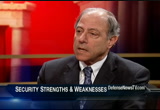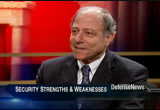tv This Week in Defense CBS December 30, 2012 8:00am-8:30am EST
8:00 am
welcome to "this week in defense news." i'm vago muradian. with everyone from terrorists to grandparents using social media, we'll look at how dod and the cia are exploiting this new technology as a powerful intelligence tool. then with washington mired in political gridlock we take a closer look at the last great senate. but first, the nonpartisan stimson center recently released a report, a new u.s. defense strategy for a new era that outlines four approaches for cutting defense spending but maintaining capability. stimson's co-founder barry blechman spearheaded the study. the report has become a must- read for anyone involved in the
8:01 am
coming defense review or budget planning team. barry, welcome to the team. >> thank you, vag go. >> congratulations for your slot on the defense news top 100 most influential people. >> that was the biggest thrill of the year. >> so let's start off with the report. each report begins with assumptions about threats to the united states to be facing and what's going to be needed to meet them what. are those threats and what's the right strategy to address those threats as cost efficiently as possible? >> the group was more optimistic than many people in looking at the world. they see russia as a country that doesn't pose any threats now and really won't, can't for many years. they see china as a potential threat in the future but recognize we have common interests in china which would ease that threat. and they see the great instability in the middle east as posing specific threats to us such as the chemical weapons in syria which could fall in
8:02 am
the hands of terrorists, but see these threats as threats to be managed, not to be resolved once and for all. meaning we can protect the chemical weapons. we don't have to go in and turn syria into a democracy. >> you want the united states to build one of the points that the report makes early on, to build on comparative strengths and address comparative weaknesses. from your standpoint what are those strengths that need to be built on, and then what are the weaknesses that need to be addressed? >> well, our military forces have unprecedented capabilities. we've spent a lot over the last 10 years, as you know, and it shows in our naval power, our air power, our space capabilities, our intelligence, surveillance, reconnaissance capabilities. our forces are flexible to move quickly all over the world and conduct campaigns of unprecedented lethalty really. and that's what we want to
8:03 am
build on, that kind of ability to reach out and either help people in natural calamities, or pound someone who is doing harm to us or our friends. >> what are comparative weaknesses that need to be addressed? >> the weakness is not the fault of anyone in the military. the weakness is that the problem -- the mission we gave to our ground forces that is turning foreign societies into replica of ourselves, into democracies with great security and effective, honest governance is just too hard. we can't do it. we failed to do it in vietnam, and we are having difficulty in iraq and afghanistan is proving very difficult. so we concluded, do not get involved in protracted nation building exercises. >> you guys did look at a range of options. give us a sketch on what these options are and what are the major trade-offs. >> first we built a strategy,
8:04 am
then we tested the strategy at different budget levels, as you said. one was a budget which would keep up with inflation. one was the president's budget. one was what we call the smooth sequester. we took the sequester cut and reduced it to a 10% cut over 10 years from the president's budget. then we took one which matched previous draw-downs after vietnam and the cold war, which is a 15% cut from the president's budget. and for each of those we said, well, if you are going to reduce, given this strategy, what would you cut, and what would you try to build on? >> what are the most vulnerable capabilities and the systems that ended up getting hit, depending on the budget? >> obviously if you are not going to fight protracted ground wars, you can cut ground forces. we have built them up over the last 10 years. so in the lowest budget
8:05 am
scenario, we go from 0-odd army brigade combat teams down to 30 in our lowest one. we cut the marines by about a third as well. if that becomes necessary in the fiscal environment. we don't recommend we do this, but we say that should be the lowest priority. >> you did not endorse any one of these options. you didn't make that hard choice. why didn't you make the hard choice, and given your experience, which one of these scenarios is more likely than the others? >> well, i think the most likely scenario is something like that 10% reduction from the president's current budget plan. the overall fiscal pressures are going to push us that way because of the deficit issue. and the one thing i would like to add is, these choices of what systems to cut or what forces to cut would be far less difficult if we could make the defense department more efficient. and we identify in the study
8:06 am
some $900 billion in potential savings just through greater efficiency, particularly in the way we utilize manpower. so if we could pocket that, then we wouldn't to have cut our combat forces as much. >> but let me ask you something that i've asked almost everybody in the administration. the administration is banking on huge savings from better buying power, reorganizing processes and becoming more efficient, but the trouble is what happens if the savings don't materialize? where are we going to get savings in that case? >> well, the hope is that the fiscal -- because of the fiscal pressures, the services and the congress will be more cooperative in actually implementing these savings. these efficiencies are not made up by academics like myself. these were recommended by official government study groups and like the defense business council and so forth. so we're hoping the fiscal pressures will at least give us 20% of that $900 billion, which
8:07 am
would greatly ease the choices facing the defense department. >> do you think -- and we've talked about in this the past -- is the right approach to be going into this kind of scenario to actually make very big cuts and very big trade- offs very early on? >> this is essential. all the members of the group agreed that the worst thing to do is to say, okay, this year we're going to cut ten so we do a little slice. then the next year you have to cut another ten and do another slice. they say give us the long-term picture, and we have the strategy, and we'll know how to implement that strategy, and we can do it rationally in a way which minimizes the disruption to our combat forces. >> there's a tendency, though, to look at defense and national security as marle the pentagon what. do we need to do from the whole of government standpoint? some of the other departments are being hit harder. state department, for example. >> this is admittedly a weakness of the report.
8:08 am
our mandate was to only look at the defense budget. we should be looking at the whole international affairs budget because we have to take a whole of government approach to solving these international problems. the military is not particularly good at some things, where diplomacy or development aid would be much more help. so i would like to see an integrated budget. that's not going to happen. the congress won't allow to the happen. but at least in our thinking, in the administration's thinking, they could pool resources and look at trade- offs between defense and state. >> barry, thanks very much. at least that's a hope for to 13. >> i hope. so thank you very much. >> coming up, how the pentagon and intelligence agencies are exploiting social media. you're watching "this week in defense news."
8:10 am
when pentagon officials talk about intelligence surveillance and reconnaissance, known as isr, they usually mean optical radar and electronic eavesdropping but humans are becoming unwitting sensors and the pentagon and u.s. intelligence agencies are trying to harness population centric isr. the 400 million tweets sent around the world each day can be mined for valuable intel clues. and with the right software and technology, spy agencies can turn all that data into a powerful predictive tool. aram roston is the editor of a siser to publication to defense news and is the author of the cover story, unwitting sensors, how dodd is exploiting social media. aaron, welcome to the show. >> thank you. >> when did the military and intelligence agencies realize that social media was a powerful tool and what did they hope to get for it that they're
8:11 am
not getting from other sorts of intelligence feeds that they're getting now? >> the c.i.a. has been interested in it for years. to ar long time. but dod is just getting interested right now. the last couple of years. and what they hope to get is everyone leaves a digital trail. increasingly, around the world, everyone has smart phones, cell phones, computers, and increasingly, those trails, the thinking is, can provide insight into intelligence that otherwise wouldn't be obtainable. it is like talking to the entire world at once. but it is not as if they can read every little bit of data out there. they have to have powerful tools to examine what is out there. and understand what they need. >> some of this is trend alice for example, when have you large -- trend analysis for example when you have large crowds and folks are use the information. what are some of the tools that the intelligence agencies are using to be able to mine all of this information that is out there? >> first of all, they neat to get it all. -- they need to get it all. one of the ways they get it all
8:12 am
is twitter. twitter sells a product to a very few companies call the twitter, the full twitter fire hose, and that fire hose terminology gives you an impression of how much data it is. 400million tweets is obviously so much data, it is impossible. >> a day. >> 400 million a day. >> yes. it is impossible for anybody to even grasp how big that is. so a number of companies are trying to mine it and market it in ways that are specific to dod and the c.i.a., and other intelligence agencies. so who are some of the guys who are most prominently involved in both developing these sorts of tools, what are the companies involved, and what are the agencies involved in supporting it? >> one of the agencies that is most intrigued by it is the office of naval research. >> onr. >> and they have a component examining it. and they have been looking at the predictive tool, looking at open source intelligence in general and trying to figure out what is there. the vast amount of open source
8:13 am
intelligence that exists now compared to what used to exist is what they're really sort of intrigued by and trying to exploit. >> and the c.i.a.'s venture capital firm has been interested in some of this stuff. what are some of the companies that are developing products? >> one of the companies funded by the c.i.a. think-qtel was a firm called intensity in california and they provide powerful tools and they're one of the customers for the full twitter fire hose. that's one company. another one is sort of a smaller group called intensity. they market to state department and to others, and again, the same type of products. booz allen is developing its products to say we can do this too and have their own firehouse and applied their own software. and they believe they can apply it in different ways to look at all kinds of bulletin boards and social media in general. not just twitter. >> are there real world examples of how this intelligence that is gathered is helping decision makers? >> people talk about libya a lot. it gives you maybe indications
8:14 am
of what is happening, as things went on. people talk about egypt a lot. and predictive analysis, and during egypt's arab spring. whether it worked or not is the issue. we just don't know how much the u.s. really understood about motivations in play at the time. and again, did it help the policy making? that's unclear, too, because the formulation of policy is not necessarily contingent on what we know about what is on the ground. >> what are the privacy and the legal issues that are associated with this new realm? >> the dod and the intelligence agencies try not to spy on a u.s. person. that's the term terminology they use. they're not allowed. to the fbi has different rules. but generally, u.s. persons aren't supposed to be targets for this sort of activity. so it is very sensitive. they're not -- they don't like to monitor the u.s. persons. however, this is all open source. or much of it is open source. >> correct. >> so you have this balancing
8:15 am
act. even in the u.s., monitoring has to be specially authorized. that's why they're trying to figure out, even now, exactly what the legal ramifications for it all are. and they're very sensitive to it. it is something that they've been dwelling on quite obsessively. >> i can see there being a tremendous balance there because it is open source information. on the other hand, you know, americans are retweeting what foreign guys tweet and stuff like that. so if you forward an al-shahab tweet and are you one of those guys? >> there is a quote, one of the social media experts who points tout is one thing for coca-cola to monitor your tweets and another one for the dod to monitor your tweets. >> everybody is already monitoring, it is powerful marketing tool. >> in the 30 seconds or so that we've got are what are some of the major drawbacks of this technology? >> well, you don't want to give up expertise, so the sort of balancing act is do we choose to listen to experts who do it the old-fashioned way, try to get sources, read the material
8:16 am
and know what they know? or do we gather in almost sort of a computer stream of data and put too much faith in it when it could be manipulated in a sense. do we know what sampling of the population uses twitter or uses other social media. maybe the people are really interested in it don't do it and there is a self selected population who are doing this, who are the unwilling sensors as we call them. >> aram, thanks for joining us. fascinating article. up next, a look at the lessons from one of the most lessons from one of the most productive senates in history. . no way out. my usualt ransport was nowhere to be found. i knew, then and there, that i needed wheels asap. thats alpha, sierra, alpha...pickle. ahem! sis here's in the military, so i can join navy federal too. he's getting a great rate - so now he can drive himself to laser tag. it's a real sport.
8:19 am
gridlock in washington may seem like business as usual today but it hasn't always been that way. throughout the 1960's and '70s during one of the most turn you leapt periods in american history bipartisan senates drove sweeping reform to civil rights and social programs while challenging the executive branch over the vietnam war and ultimately moving to impeach president nixon over the watergate scandal. our next guest ira shapiro is the author of "the last great senate:courage and statesmanship in tames of crisis." welcome to the program. >> nice to be here. >> why do you call it the last great senate? >> well, because from the early 'sick through about 1980 we had a senate that was in the forefront of everything that was going on in the country, and accomplished a great deal. the senate of humphrey, muskee,
8:20 am
baker, ted kennedy, many other great americans. and we haven't had a senate like that for the last 30 years. i don't mean it's the last great senate we'll ever have, but we haven't had one since. >> why the decline, do you think, from that caliber of political leadership that we had in that era? >> a lot of reasons. first, it's actually harder to be a senator in this day and age of campaign finance demands. lobbying corps that's grown five-fold, 24-hour media. it's a much more difficult situation. but the real key is that the senate was not a partisan institution, the great senate. bipartisanship ran deeply in sort of the life blood of the senate. now for the last 20 years about we've had a hyper partisan senate, and that's what's holding us back. >> what were some of the core
8:21 am
attributes of that generation of leaders that could be emulated today to help solve some of today's problems? >> i think the two most important things that made the great senators identifiable was a laser-like focus on the national interest. they weren't really partisans, and although they cared about their states, they were -- they thought they were about the national interests. they were also devoted to the senate as an institution to solve problems collectively. so they would debate fiercely, but then they would bring things to resolution through principled compromise and voting. it wasn't a time of obstruction, and it wasn't -- they didn't see the senate as just being there to promote their individual agendas. >> are there any of this current generation that, given that you have seen some of the greatest, have the attributes of greatness in them? >> oh, i think.
8:22 am
so i think that senators like carl levin, richard lugar, who is now leaving, john kerry, john mccain, and some of the younger senators i think we will see in the coming years that they step up to be excellent senators. we're not short of capable people there. the problem is that the senate, what i call the senate ecosystem, sun healthy. it's the hyper partisanship that's holding us back and the efforts of people like the ones i mentioned, or like olympia snowe, who announced her retirement and is retiring. ?iewn fortunately. >> they're hampered by the fact they work very hard, and then the hyper partisanship prevents the accomplishments. >> but are there any sorts of maybe mechanical policy senate rule changes that could actually help bring or help restore that balance? >> well, i think -- i actually do believe we need to change the senate rules. i think we have to get back to
8:23 am
a time when filibusters were real and rare. i think these holds that go on indefinitely and block nominations and legislative action is unacceptable. we have seen -- we have seen on struck shun used as a partisan tal. the one thing i would say, i think we're at a defining moment. james baker's old phrase. this is really a time when we will find out whether the senate can reverse its decline, and i'm more optimistic. >> what gives you that sense of optimism? >> number one, i believe that the public demands it. number two, i think that many of the senators are as angry and frustrated with the current situation as the public is. they don't think they were sent to washington to be partisans. they think they were sent to
8:24 am
solve the nation's problems. and number three, the problems and particularly dramatized by the terrible events at newtown, the problems are there to be addressed. and i think that this is a defining moment. i think it is going to change. >> and we do need to have some really, really great minds come back in, like lugar and snowe
8:26 am
as part of the latest defense budget congressional leaders around the administration put acrimony aside to come together switching export licensing authority for commercial satellites from the state department to the commerce department. state gained control of those licenses in 1999 after china obtained secret satellite technology by launching american-made commercial satellites in orbit, improving the accuracy of beijing's missiles but tougher standards cost u.s. satellite makers more than $21 billion in sales as frustrated customers turned to european and asian suppliers. the obama administration has been keen to reform the nation's export control structure to boost exports as it curbs domestic military spending but getting that through a recalcitrant congress has been challenging. critics fear american technology into the wrong hands. that's a valid concern but
8:27 am
blocking sales and strangling america's space industry is an even bigger threat. if you are not selling anything you are not controlling anything, either. working together republicans and democrats solved this problem. they should continue the system and tackle the nation's other problems. thanks for joining us for "this week in defense news." i'm vago muradian. you can watch on-line it at defensenewstv.com. before we go i would like to wish everybody a very happy new year. i'll be back next year at the same time. until then, have a great week.
8:29 am
patient centered research, is it more than a slogan. patient leaders rate their progress. i'm steve usdin. welcome to "biocentury this week." your trusted source for biotechnology information and analysis, "biocentury this week." it has blazed the trail. now as we've highlighted many types on "biocentury this week," patients have moved to the center of every aspect of medicine, especially the search for new treatments. patient groups are funding and directing research. they're working with regulators to design clinical studies, helping companies recruit patients for trials, creating registries that yield priceless data about the natural history of disease and much more. but patient advocacy and activism is still a work in progress. >> w
143 Views
IN COLLECTIONS
WUSA (CBS) Television Archive
Television Archive  Television Archive News Search Service
Television Archive News Search Service 
Uploaded by TV Archive on

 Live Music Archive
Live Music Archive Librivox Free Audio
Librivox Free Audio Metropolitan Museum
Metropolitan Museum Cleveland Museum of Art
Cleveland Museum of Art Internet Arcade
Internet Arcade Console Living Room
Console Living Room Open Library
Open Library American Libraries
American Libraries TV News
TV News Understanding 9/11
Understanding 9/11




























